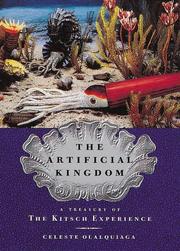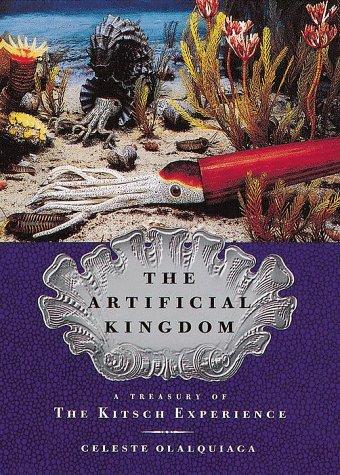Check nearby libraries
Buy this book

The Artificial Kingdom is the first book to provide a cultural history of kitsch, an immensely popular aesthetic phenomenon that has always been disdained as "bad taste," or a cheap imitation of art. Proposing instead that kitsch is the product of a larger sensibility of loss, Celeste Olalquiaga shows how it enables the momentary re-creation of experiences that exist only as memories or fantasies.
Simultaneously exposing and celebrating this process, Olalquiaga gives us a bold, trenchant analysis of what and how we see when we look at kitsch.
Check nearby libraries
Buy this book

Previews available in: English
Subjects
art, attachment, collectibles, fantasy, figurines, imagination, keepsakes, kitsch, loss, mementos, memory, narrative, nostalgia, past, preservation, remembering, remembrance, sentiment, sentimentality, snowglobes, time, tourism, New York Times reviewed| Edition | Availability |
|---|---|
|
1
The artificial kingdom: on the kitsch experience
2002, University of Minnesota Press
in English
081664117X 9780816641178
|
eeee
|
|
2
The Artificial Kingdom
November 1, 1999, Bloomsbury Publishing PLC
Hardcover
0747545359 9780747545354
|
zzzz
|
|
3
The artificial kingdom: a treasury of the kitsch experience
1998, Pantheon Books
in English
0679433937 9780679433934
|
aaaa
|
Book Details
Edition Notes
Includes bibliographical references and index.
"With remarkable objects of art and nature, extraordinary events, eccentric biography and originsl theory plus many wonderful illustrations selected by the author."
Classifications
External Links
The Physical Object
Edition Identifiers
Work Identifiers
Source records
Internet Archive item recordLibrary of Congress MARC record
amazon.com record
marc_columbia MARC record
Work Description
The Artificial Kingdom is the first book to provide a cultural history of kitsch, an immensely popular aesthetic phenomenon that has always been disdained as "bad taste," or a cheap imitation of art. Proposing instead that kitsch is the product of a larger sensibility of loss, Celeste Olalquiaga shows how it enables the momentary re-creation of experiences that exist only as memories or fantasies. Simultaneously exposing and celebrating this process, Olalquiaga gives us a bold, trenchant analysis of what and how we see when we look at kitsch.
Links outside Open Library
Community Reviews (0)
History
- Created April 1, 2008
- 10 revisions
Wikipedia citation
×CloseCopy and paste this code into your Wikipedia page. Need help?
| July 15, 2024 | Edited by MARC Bot | import existing book |
| December 4, 2022 | Edited by ImportBot | import existing book |
| November 28, 2020 | Edited by MARC Bot | import existing book |
| April 27, 2017 | Edited by ImportBot | import new book |
| April 1, 2008 | Created by an anonymous user | Imported from Scriblio MARC record |
















